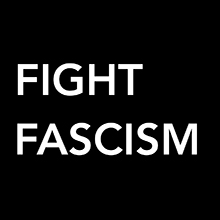Initial Thoughts on the TikTok Ban
2025-01-20
Return to Blog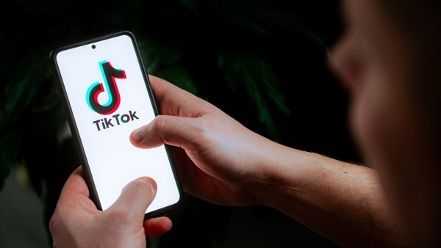
The last 48 hours have been especially tumultuous, a fitting preview of what is sure to be an especially unstable next 4 years.
The TikTok ban went into effect, and the app was unusable within the United States.
The incoming president made an online post promising to not enforce the ban, which ByteDance and TikTok Inc. evidently took at face value because not even a full 24 hours later, the app was functional once more.
Yet in the Google Play Store and Apple’s App Store, the TikTok app remained unavailable for new downloads.
As of yet, there seem to be no meaningful progress to sell the app to an American-owned company in order to satisfy the requirements of The Protecting Americans from Foreign Adversary Controlled Applications Act.
What a mess.
Later this week, I’ll be teaching the first day of my “New Media and Society” course. Though this whole TikTok situation is difficult to keep up with, with new developments seemingly every hour, it is nevertheless an ideal example to draw upon day one to demonstrate the relevance and immediacy of such a course. I’m planning on dedicating significant time to discussing the ongoing TikTok situation and why it represents the complex interconnectedness of media, technology, and other aspects of society. As I attempt to bring my varied ideas and reactions to the ongoing newscycles into some semblance of an organized structure, what follows is some of what has come to mind for me.
Here’s the basic throughline: this whole thing is stupid and blatant political theater. But it is still something that we need to pay attention to. The TikTok ban and its ongoing aftershocks are significant—not specifically because of the TikTok app and its user communities, but because of what it represents about the current state of the country and the relationship between technology companies, billionaires, and our institutions of government.
The basic news that was circulating on January 19th was that the TikTok ban would not be enforced, meaning that the app could continue to operate in the United States. The basis for this reversal? A single post that Trump made on Truth Social:
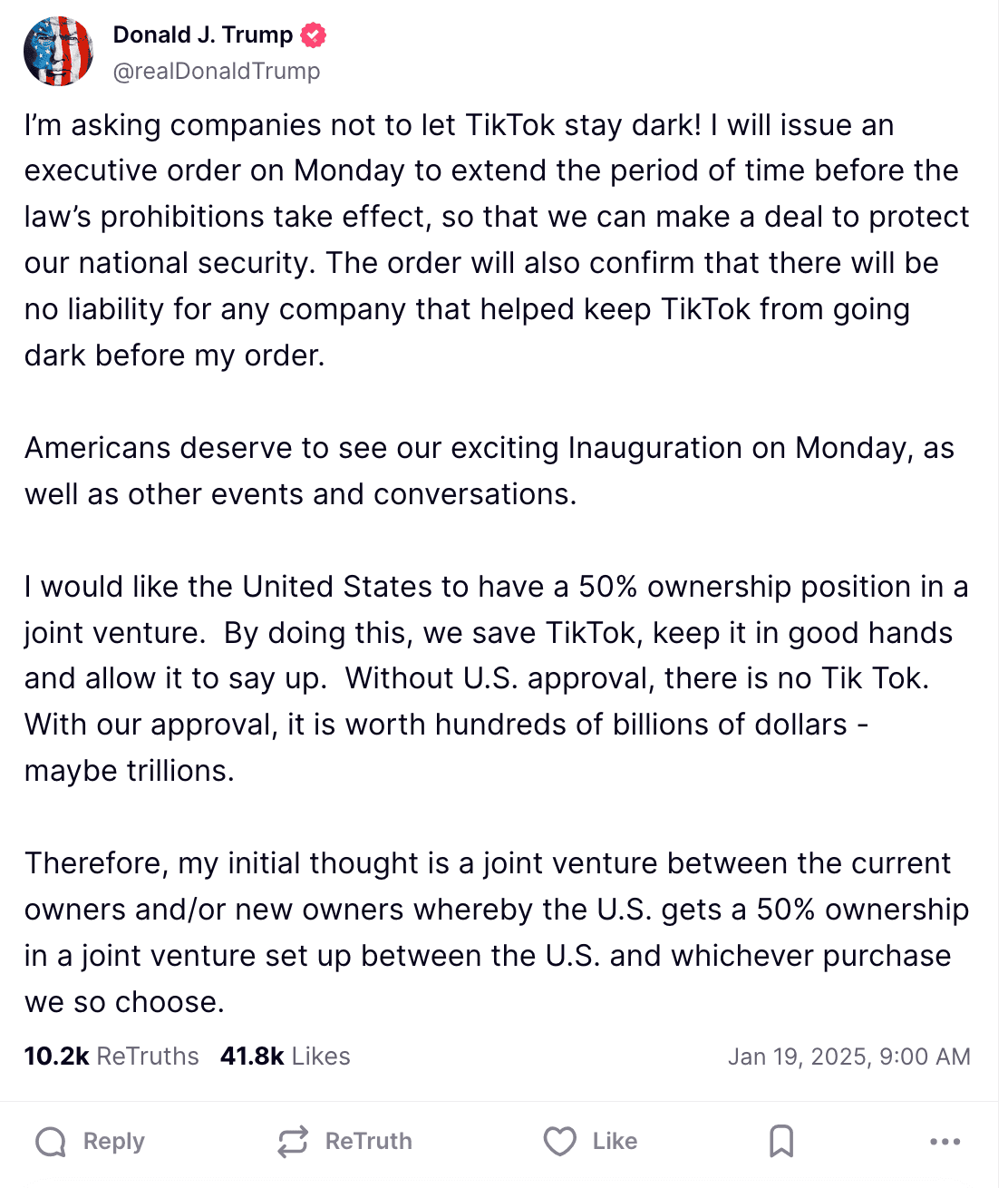
Even though he was not yet president at the time this was posted, it was evidently enough for ByteDance and TikTok Inc. to feel comfortable with resuming operations in the U.S. and not facing legal liabilities. Later that day, Trump spoke at a “victory rally” to a crowd of supporters at the Capitol One arena in Washington, DC. Characterstic of his public experiences, he jumped from topic to topic, with little coherence throughout. Though many news outlets reported on his words as giving more clarity on his plan for saving TikTok, I’m not convinced that there is much plan here at all:
And as of today, TikTok is back. So, you know, I did a little TikTok thing we have a guy, TikTok Jack he’s a young kid, like 21 years old. And we hired this guy, and I went on TikTok; can you believe what I’ll do to win an election?And we went on TikTok and Republicans have never won the young vote, the youth vote. They win a lot of votes, but they never won the youth vote. We won the youth vote by 36 points. So I like TikTok. I like it. I had a slightly good experience wouldn’t you say? […] If you do approve, they’re worth like a trillion dollars, they’re worth some crazy number. So I said, I’ll approve, but let the United States of America own 50% of TikTok.I’m approving on behalf of the United States. So they’ll have a partner, the United States, and they’ll have a lot of bidders and the United States will do what we call a joint venture. And there’s no risk, we’re not putting up any money. All we’re doing is giving them the approval without which they don’t have anything. So, I don’t know, it sounds like that works. What do you think, good? So, whether you like TikTok or not, we’re gonna make a lot of money.
I am not a lawyer, and my understanding of the law is based just on my reading of it. But when I read some of the actual sections of the Protecting Americans from Foreign Adversary Controlled Applications Act and attempt to parse Trump’s word salad from Sunday, I’m not sure what actual steps he intends to take, beyond just proclaiming that he has “saved TikTok.” According to the law (which passed with broad bipartisan support, by the way), there is the possibility for the President to issue a 90-day extension on the divestment deadline, if certain criteria are met:
(3) EXTENSION.—With respect to a foreign adversary controlled application, the President may grant a 1-time extension of not more than 90 days with respect to the date on which this subsection would otherwise apply to such application pursuant to paragraph (2), if the President certifies to Congress that— (A) a path to executing a qualified divestiture has been identified with respect to such application; (B) evidence of significant progress toward executing such qualified divestiture has been produced with respect to such application; and (C) there are in place the relevant binding legal agreements to enable execution of such qualified divestiture during the period of such extension.
Essentially, if the President tells Congress that the company is currently in the process of selling off portions of the app to meet the law’s requirements, it’s possible to extend the deadline by up to 90 days. Given how TikTok made zero indications of being interested in taking the divestment path, I'm not sure what basis there would be for making such a claim. Technically I suppose this just would simply mean that Trump is lying to Congress, which, yeah maybe is pretty on brand. I am also mindful of the fact that my reactions are also reflective of me desperately wanting to live in a world where laws and words matter. That might not be the case.
What is clear, though, is that TikTok is happily bending the knee and defering to the perceived authority of the Trump Administration. Despite there not really being a clear path forward, at least in terms of how the law is written, the company has taken Trump’s statements at face value and perceives them as a believable assurance that they will not face legal liability for continuing to operate. Just take a look at the in-app announcements and how much they play up the role of the incoming Trump administration:
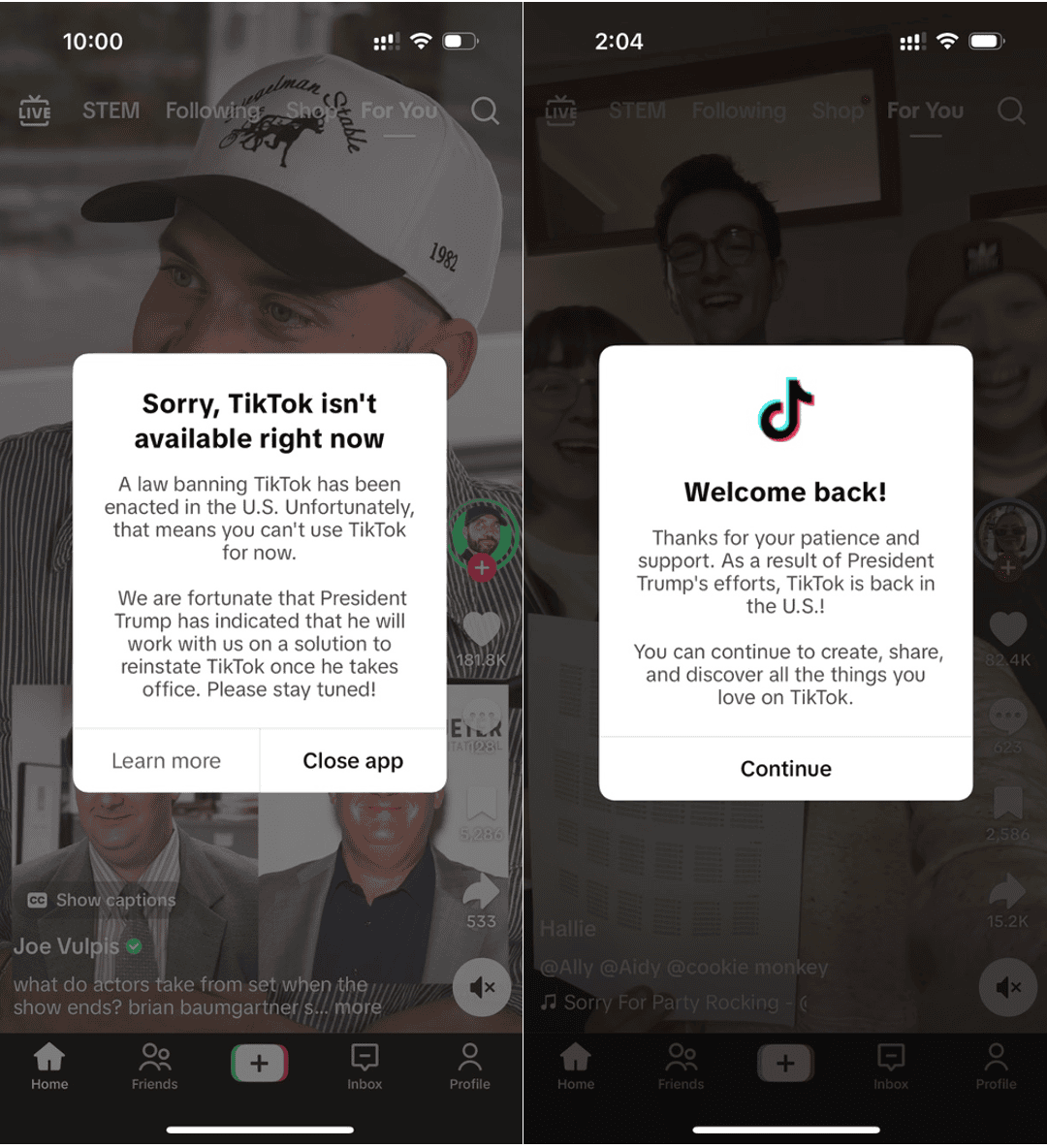
But this isn’t universally the case. Remember, it’s not just TikTok Inc. and ByteDance which may face legal penalties. According to the law, any service providers which facilitate access to any banned apps may also be liable—to the tune of hundreds of millions of dollars. Specifically, they risk $5,000 in penalties per person who uses their service to access the app. Given the huge TikTok user base, that has the potential to be a massive total price tag for these companies. Understandable that they might be skittish about putting hundreds of millions of dollars on the line based on what Trump posted online, before he was even president. Republican senator Tom Cotton posted on Twitter: “Any company that hosts, distributes, services, or otherwise facilitates communist-controlled TikTok could face hundreds of billions of dollars of ruinous liability under the law, not just from DOJ, but also under securities law, shareholder lawsuits, and state AGs. Think about it.”
And think about it they have. In the Google Play Store and Apple App Store, the TikTok app remained unavailable, even as the app returned to normal functionality for those who already had it downloaded. Given the high-profile nature of this specific situation, both app stores placed messages explaining to users why the app was unable to be downloaded. Apple created a dedicated page on its support website explaining its compliance with the law.
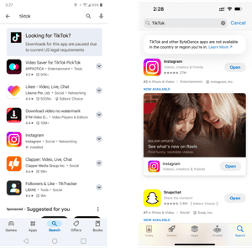
But not all service providers seem to be taking the same approach. The law applies not just to app stores as service providers, but other companies which provide cloud computing, content distribution networks (CDNs), and other online services. Companies such as Oracle and Akamai, though less publicly-known than large firms such as Google and Apple, also faced potential liability. Oracle, in the days leading up to the ban taking effect, had stated that it was prepared to shut down servers to be in compliance with the law. The fact that TikTok returned to normal operation after Trump's announcements suggests that at least some of its cloud service providers and CDNs also took the Truth Social post as a "good enough" assurance that they too would not face legal liability.
But here’s the other kicker: in the Supreme Court case deciding the fate of this law (TikTok v. Garland, 2025), the federal government stated that it would be able to enforce the law up to five years later. So even if Trump follows through with his guarantees to not enforce the law, once his term ends, the next president could just as easily go after all these companies to recoup the fines. (Granted, this too is based on my desire to live in a world where laws--and term limits—matter. Yeesh).
One of the other questions raised by this scenario pertains to Section 230 of the Communications Decency Act. This law has been a cornerstone of how platforms engage with user-generated content, and has been largely credited for enabling the internet to develop and evolve into its current form. Section 230 provides a broad legal shield which protects internet "content providers" from being held liable for content that users post using their platforms. This law has let companies feel safe with providing interactive platforms knowing that they aren't likely to be legally liable for the actions of their users.
No provider or user of an interactive computer service shall be treated as the publisher or speaker of any information provided by another information content provider.
But as we witness this political theater unfold, I wonders if its interpretation could shift. Section 230 is often discussed in relation to social media companies, but it technically applies to other platform companies, such as cloud computing providers, content distribution networks, and potentially app stores. I would argue that companies providing infrastructure as a service (IaaS) are also platforms in their own right. The initial TikTok v. Garland case centered on the 1st Amendment merits of the law. And the Supreme Court held that the law was not an infringement of the company's freedom of speech. But what of its compatibility with Section 230? There is not much clarity right now, and I would not be surprised if companies (and their shareholders) are reluctant to gamble hundreds of millions of dollars in liability.
So what are some of the big takeaways for me? As I watch the TikTok fiasco continue to unfold alongside everything else this with this new administration, what are we left with?
First and foremost, this whole thing is stupid. It’s political theater, and adds spectacle to the incoming Trump 2.0 White House. Trump is clearly going to use it as a way to claim victory, and I will be disappointed (but not necessarily surprised) if millions of people eat it up. More significantly, though, the TikTok ban shows just how brazen and corrupt this government is, and how comfortable tech companies are with buddying up with it. Trump is a narcissist will take actions that make him look good. Tech companies will cozy up with an administration that is doing reprehensible things, so long as they think it will help their bottom line.
This is not yet settled. The newscycle will die, but the aftershocks will continue to come in the next several weeks. I am especially curious to see if Trump issues any executive orders, and whether he tries to invoke the 90-day extension which is built into the law.
The primary point that I plan to share with my students, though, is this: the TikTok ban and its surrounding controversies isn’t really about TikTok. At least not entirely. What it really gets at are broader questions about the country we live in and how we think power ought to be organized:
- How do we apply free speech to companies?
- Are algorithms a company's expression?
- What is the power of the presidency?
Sure, it is “just” about TikTok at this point. But it also can serve as a trial balloon, a way to test the waters of pushing the boundaries of the Presidency’s constitutional powers. A more drastic example that comes to mind is Andrew Jackson and the Trail of Tears. The Supreme Court, in Worcester v. Georgia (1832) found that the Federal Government's plan to seize land from the Cherokee Nation was unlawful. Jackson ignored this ruling, supposedly stating, “John Marshall has made his decision, now let him enforce it." So Trump saying that he won't enforce a law is "just" about TikTok. But we should still pay attention.
“Fascism should more appropriately be called Corporatism because it is a merger of state and corporate power” ― Benito Mussolini
Furthermore, I am watching with anticipation and concern about what this whole event might represent about the new relationship between technology companies and the government. This is hardly a new phenomenon, but the ongoing overlap between corporations and government should at least raise questions for everyone. Is this the organization of power that we want? Whose interests are actually being served, and whose are left out? TikTok feeling comfortable with resuming operations, despite what the law says, simply based on an announcement made by the President-elect is profoundly contrary to the ideals of our democracy. Indeed, it could be understood as a case of technocratic fascism. Sadly, it is increasingly clear that millions of Americans do not feel the same, and in fact welcome these developments with outstretched arms.
Return to Blog
